France is home to some of the most innovative and eco-friendly buildings in the world. With a focus on sustainable architecture, environmentally friendly construction, and green building practices, the country has made significant efforts to reduce the environmental impact of its buildings.
– The government established the “Le Grenelle de l’Environnement” process in 2007, which included recommendations such as investing €1 billion in clean energy, reducing energy consumption by 20% by 2020, and implementing green taxes.
– The building labels in France, including THPE 2005 and THPE EnR 2005, signify improved energy efficiency and renewable energy production.
– France encourages the use of solar heating and offers grants for its installation, promoting the adoption of this eco-friendly technology.
– The non-residential segment is the largest contributor to the growing market for green buildings in France, with a focus on environmental sustainability reflected in the Green Growth Index of 70.9 in 2021.
Key Takeaways:
- France is a leader in sustainable architecture and environmentally friendly construction.
- The “Le Grenelle de l’Environnement” process initiated by the government has been instrumental in promoting green building practices.
- Building labels such as THPE 2005 and THPE EnR 2005 indicate improved energy efficiency and renewable energy production.
- The use of solar heating is encouraged in France, with grants available for installation.
- The non-residential segment is driving the growing market for green buildings in the country.
Promoting Sustainable Development in France
The French government has been at the forefront of promoting sustainable development and green building practices. Efforts have been made to reduce the environmental impact of buildings through energy-efficient designs, the use of eco-friendly materials, and the implementation of green infrastructure. These measures align with the country’s commitment to environmental sustainability and the promotion of a greener future.
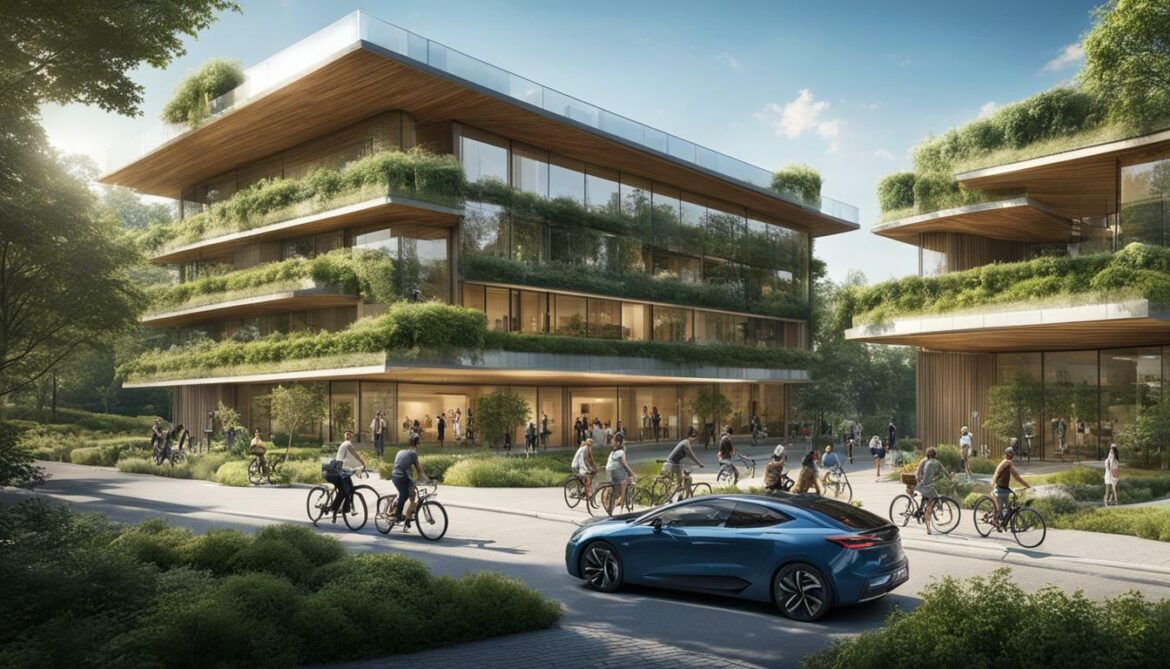
In line with these goals, France has established various initiatives to encourage sustainable construction. One such initiative is the LEED (Leadership in Energy and Environmental Design) certification system, which certifies buildings that meet high standards of energy efficiency and environmental sustainability. LEED certified buildings prioritize renewable energy sources, efficient water usage, and the reduction of greenhouse gas emissions.
The French government also advocates for the use of eco-friendly materials in construction. By prioritizing sustainable sourcing and reducing the use of harmful substances, buildings can minimize their impact on the environment. This includes using materials such as recycled steel, reclaimed wood, and low VOC (Volatile Organic Compounds) paints, which contribute to healthier indoor environments.
Add H3 if necessary and relevant:
The Importance of Green Infrastructure
Green infrastructure plays a vital role in sustainable development. It refers to the integration of natural elements, such as green roofs and permeable pavements, into built environments. These features help manage stormwater runoff, reduce heat island effects, and enhance biodiversity. By incorporating green infrastructure into urban areas, France aims to create healthier and more sustainable cities for its citizens.
| Year |
Green Growth Index |
| 2019 |
65.2 |
| 2020 |
68.5 |
| 2021 |
70.9 |
(Source: Green Growth Index)
The Impact of “Le Grenelle de l’Environnement”
The “Le Grenelle de l’Environnement” process initiated in 2007 has had a significant impact on promoting sustainable building practices in France. This comprehensive national consultation brought together government officials, environmentalists, business representatives, and citizens to address environmental challenges and set ambitious goals for the country’s green transition.
As a result of “Le Grenelle de l’Environnement,” several key recommendations were made to improve the sustainability of buildings in France. One of the most notable initiatives was the introduction of building labels, such as THPE 2005 (Très Haute Performance Énergétique) and THPE EnR 2005 (THPE with Renewable Energy). These labels indicate that a building meets stringent energy efficiency standards and integrates renewable energy systems, promoting a greener and more energy-efficient built environment.
In addition to building labels, “Le Grenelle de l’Environnement” emphasized the reduction of energy consumption and the implementation of green taxes. The French government committed to reducing energy consumption by 20% by 2020 and invested over €1 billion in clean energy projects. Furthermore, the introduction of green taxes aimed to discourage environmentally harmful practices and encourage sustainable alternatives.
The Impact of “Le Grenelle de l’Environnement” on Building Labels
“Le Grenelle de l’Environnement” has played a pivotal role in driving the adoption of building labels in France, leading to improved energy efficiency and renewable energy integration in construction projects. The THPE 2005 and THPE EnR 2005 labels ensure that buildings meet rigorous standards, contributing to the country’s sustainable development goals.
This focus on sustainability is further evident in the growing popularity of renewable energy systems, particularly solar heating, in France. The government encourages the use of solar heating in buildings and offers grants for its installation. By leveraging the abundant solar resources, France not only reduces its reliance on non-renewable energy sources but also decreases carbon emissions and contributes to the country’s overall environmental objectives.
The Growing Market for Green Buildings in France
France’s commitment to promoting sustainable building practices has resulted in a flourishing market for green buildings, with the non-residential segment leading the way. The Green Growth Index, a comprehensive measure of environmental sustainability, reached 70.9 in France in 2021, highlighting the country’s dedication to creating a greener future.
The increasing demand for green buildings can be attributed to their numerous benefits. Apart from reducing environmental impact, these buildings offer improved energy efficiency, healthier indoor environments, and long-term cost savings. As businesses and organizations prioritize sustainability, the market for eco-friendly buildings continues to expand, driving innovation and environmentally conscious practices.
| Key Initiatives |
Year |
| Introduction of building labels (THPE 2005 and THPE EnR 2005) |
2007 |
| Investment in clean energy projects |
2007 |
| Reduction of energy consumption by 20% by 2020 |
2007 |
| Implementation of green taxes |
2007 |
| Promotion of solar heating and grants for installation |
2007 |
France’s commitment to sustainable building practices, as exemplified by “Le Grenelle de l’Environnement,” has positioned the country as a leader in environmental sustainability. With stringent building labels, increased adoption of renewable energy systems, and a thriving market for green buildings, France continues to pave the way for a greener and more sustainable future.
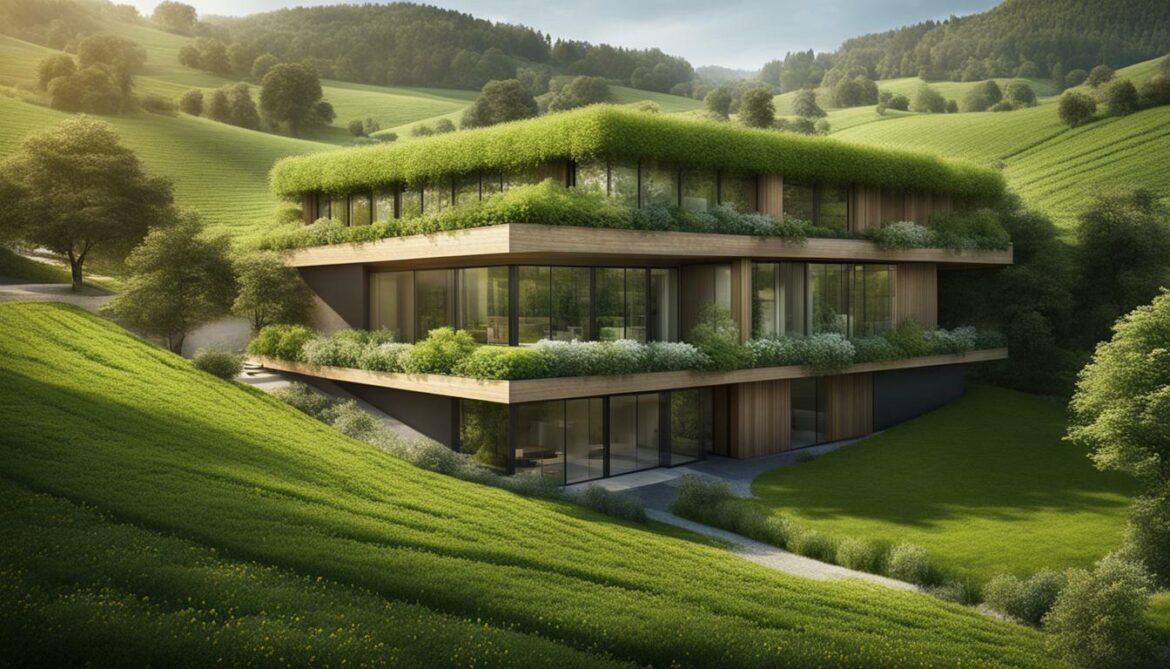
France incentivizes the use of solar heating in buildings through grants for installation, promoting energy efficiency and environmental sustainability. By utilizing solar energy as a renewable source, buildings can reduce their carbon footprint and decrease reliance on fossil fuels. These grants encourage individuals and businesses to adopt solar heating systems, making a positive impact on both the environment and energy consumption.
One of the key advantages of solar heating is its ability to harness the power of the sun to generate heat. Solar panels absorb sunlight and convert it into thermal energy, which can then be used for various heating purposes such as water heating or space heating. This reduces the need for conventional heating systems that rely on non-renewable resources and emit greenhouse gases.
With the support of grants provided by the French government, individuals and businesses can offset the initial costs of installing solar heating systems. These grants help make solar heating more accessible and affordable for a wider range of people, encouraging the adoption of sustainable practices. Additionally, the long-term savings from reduced energy bills make solar heating a financially viable option for many.
Benefits of Solar Heating
There are several benefits to incorporating solar heating into buildings. Firstly, it offers a sustainable solution that reduces reliance on finite resources, helping to preserve the environment for future generations. Solar heating systems also provide a reliable source of energy, as they are not subject to fluctuations in fuel prices or availability. Furthermore, solar heating can lead to significant energy savings, contributing to cost reductions and increasing overall energy efficiency.
By embracing solar heating and taking advantage of the grants provided by the French government, individuals and businesses can play an active role in mitigating climate change, promoting sustainable development, and building a greener future.
| Benefits of Solar Heating |
| Reduces carbon footprint |
| Decreases reliance on fossil fuels |
| Provides a sustainable heating solution |
| Reduces energy bills |
| Offers long-term cost savings |
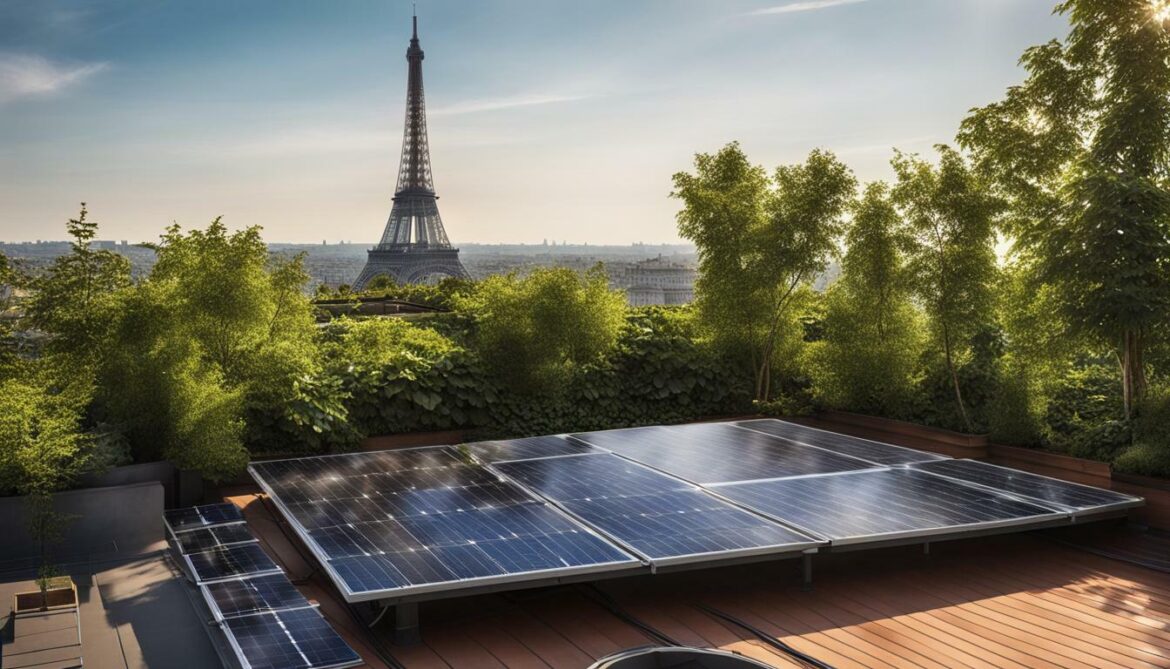
The Growing Market for Green Buildings in France
The market for green buildings in France is experiencing significant growth, particularly in the non-residential segment, as reflected by the Green Growth Index. With a focus on environmental sustainability, businesses and organizations are increasingly embracing eco-friendly construction practices and designs. This shift towards greener buildings is driven by the desire to reduce the environmental impact of structures while also reaping the benefits of energy efficiency and cost savings.
According to the Green Growth Index in France, the country scored an impressive 70.9 in 2021, showcasing its commitment to sustainable development. This index measures various factors, including green building practices, renewable energy usage, and waste management. The high score reflects the efforts made by the French government and businesses to prioritize environmental sustainability and create a greener future.
The non-residential segment plays a significant role in driving the growth of green buildings in France. Commercial buildings, offices, and public institutions are increasingly adopting eco-friendly construction practices to meet the growing demand for sustainable infrastructure. These buildings incorporate energy-efficient designs, utilize eco-friendly materials, and implement renewable energy sources to reduce their carbon footprint.
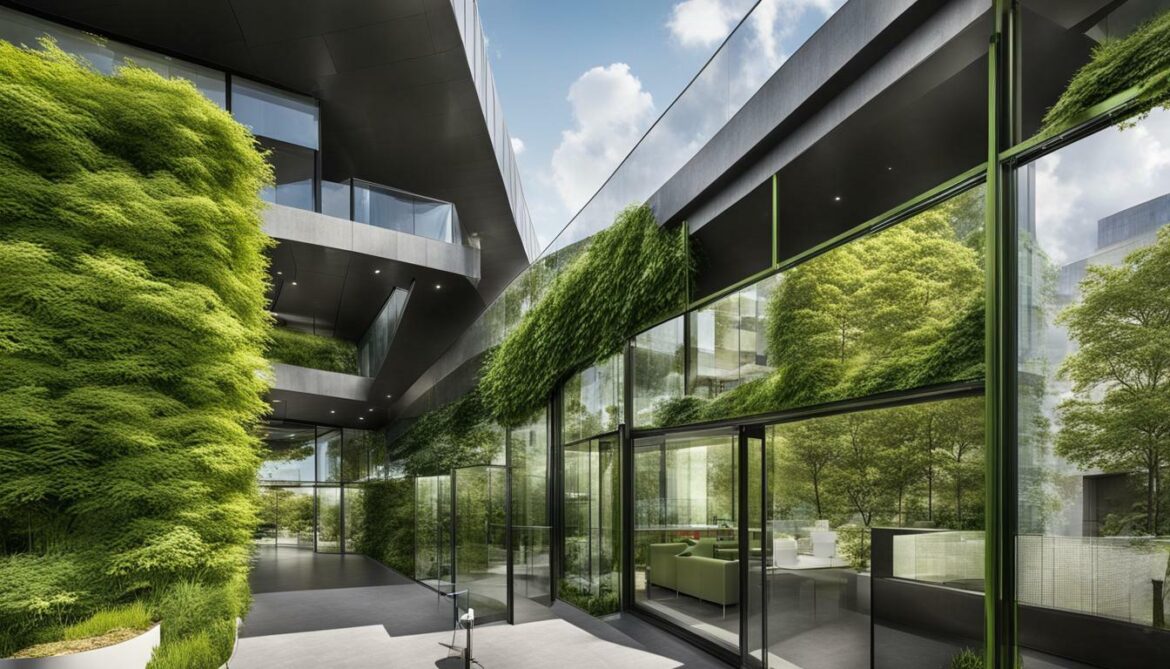
Furthermore, the demand for green buildings in France is fueled by various factors. Firstly, there is a growing awareness of the environmental impact of buildings, leading to increased demand for sustainable alternatives. Secondly, companies are recognizing the long-term financial benefits of energy-efficient buildings, such as reduced operational costs and improved tenant satisfaction. Lastly, government initiatives and regulations, such as the “Le Grenelle de l’Environnement” process, have provided incentives and guidelines for green building construction, further driving the market’s growth.
In summary, the market for green buildings in France is experiencing significant growth, particularly in the non-residential segment. With a high Green Growth Index score, France demonstrates its commitment to environmental sustainability and the adoption of eco-friendly construction practices. As businesses and organizations prioritize energy efficiency and carbon reduction, the demand for green buildings will continue to rise, contributing to a greener and more sustainable future.
Conclusion
France’s commitment to green building practices and sustainable development positions it as a global leader in environmentally friendly construction. The government’s “Le Grenelle de l’Environnement” process, initiated in 2007, has played a crucial role in driving these efforts. Recommendations made as part of this process include investing €1 billion in clean energy and reducing energy consumption by 20% by 2020. Additionally, the implementation of green taxes has further incentivized the adoption of eco-friendly building practices.
The use of building labels, such as THPE 2005 and THPE EnR 2005, has become increasingly important in France. These labels signify improved energy efficiency and renewable energy production, reflecting the country’s emphasis on reducing environmental impact and promoting sustainable architecture.
France also encourages the use of solar heating in buildings as a means of harnessing renewable energy. To support this, the government provides grants for the installation of solar heating systems, making them more accessible and affordable for both residential and commercial properties. The benefits of solar energy are numerous, including reduced reliance on fossil fuels, lower energy costs, and a significant decrease in carbon emissions.
The market for green buildings in France is rapidly growing, with the non-residential segment leading the way. The Green Growth Index in France for 2021 was 70.9, highlighting the country’s commitment to environmental sustainability and its desire to create a greener future. As the demand for eco-friendly buildings continues to rise, France remains at the forefront of sustainable development, showcasing innovative design and construction practices that prioritize both the well-being of individuals and the preservation of the planet.
FAQ
What initiatives has France taken to promote green building practices?
France established the “Le Grenelle de l’Environnement” process in 2007, which included recommendations such as investing €1 billion in clean energy, reducing energy consumption by 20% by 2020, and implementing green taxes.
What building labels are used in France to signify energy efficiency?
The building labels in France include THPE 2005 and THPE EnR 2005, which signify better energy efficiency and renewable energy production.
Does France encourage the use of solar heating?
Yes, France encourages the use of solar heating and offers grants for its installation. Solar heating is an important aspect of green buildings in the country.
Which segment contributes the most to the green buildings market in France?
The non-residential segment is the largest contributor to the growing market for green buildings in France.
What was the Green Growth Index in France in 2021?
The Green Growth Index in France in 2021 was 70.9, indicating a focus on environmental sustainability.
Source Links



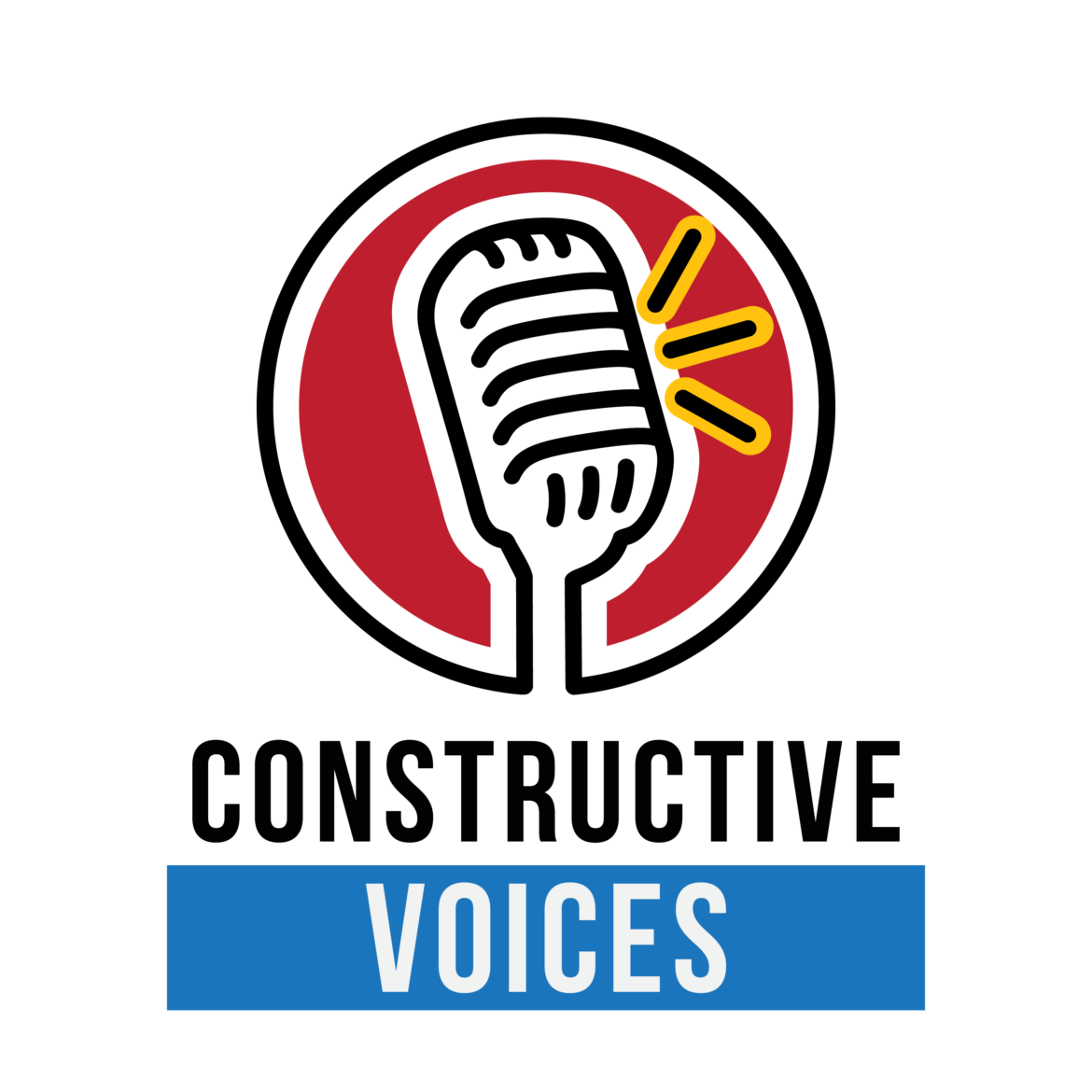


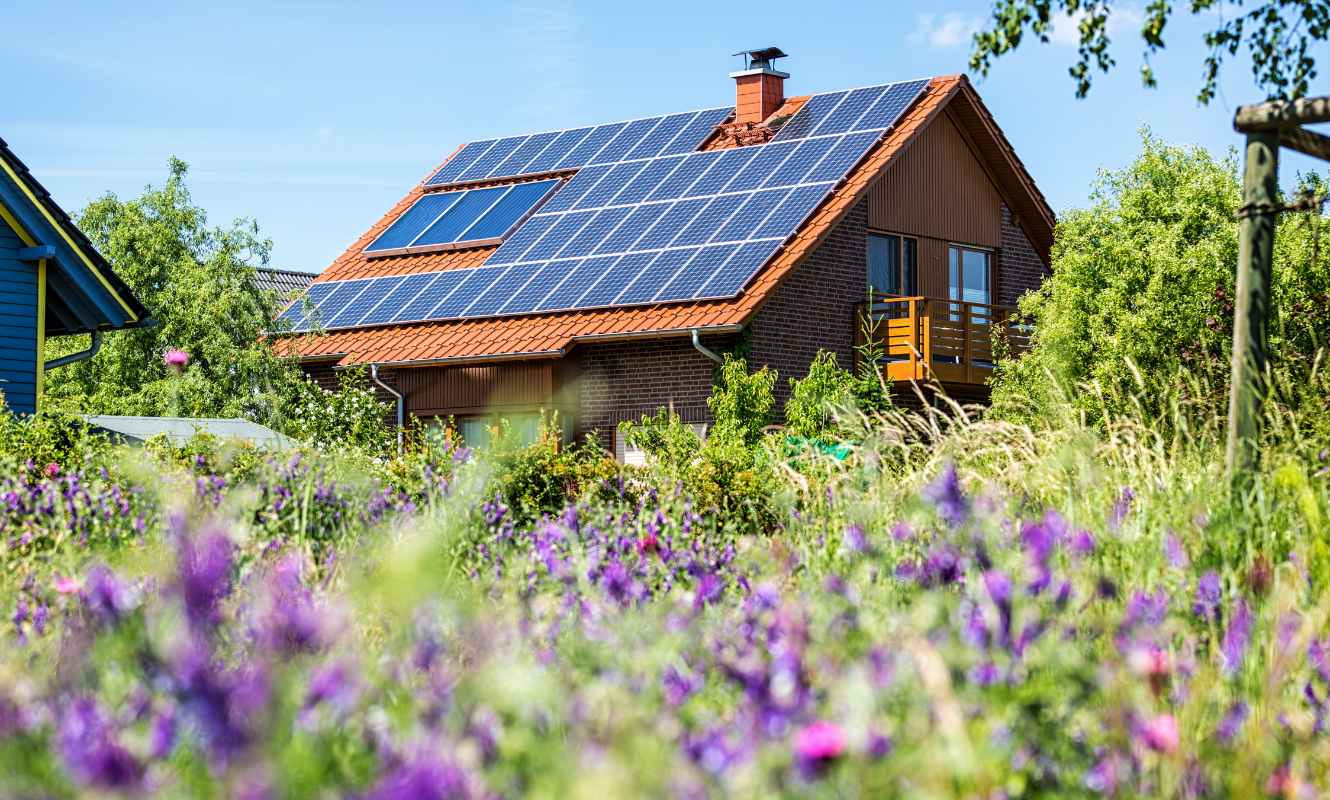




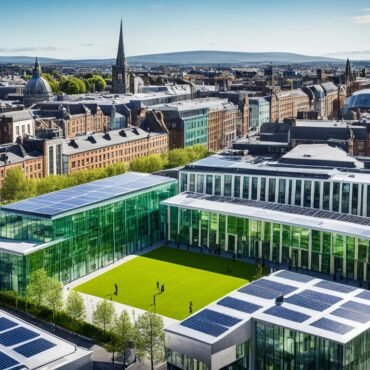
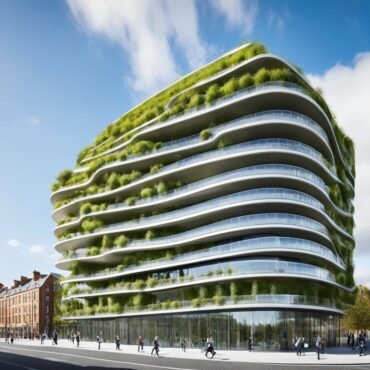




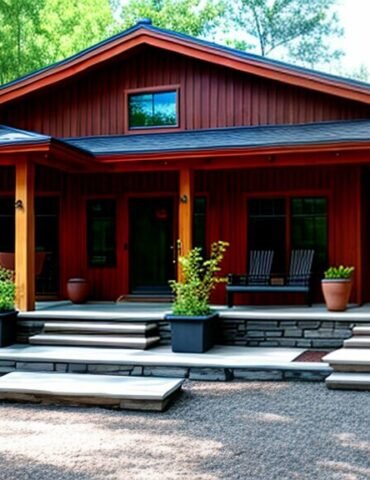




Post comments (0)